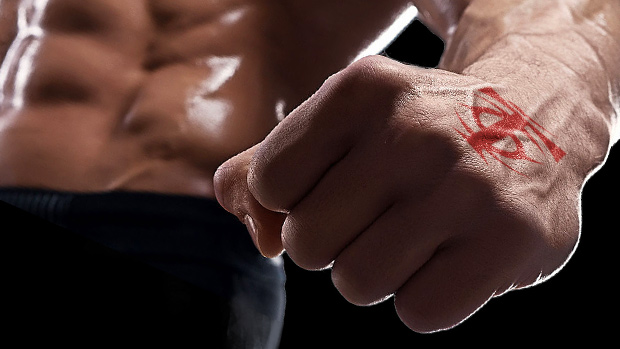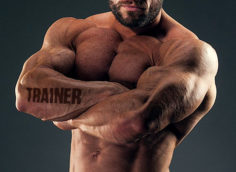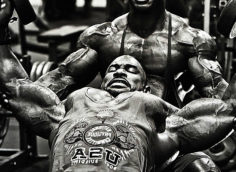The Question
What's pissing you off right now in the world of fitness or lifting?
Lots. Here's a list:
- Women who don't lift posting labia photos over and over again and writing fitness advice under it.
- Dumb lifts for attention. We got it, bro. You're stupid in the gym and didn't get enough hugs as a child.
- All of the "love your body" articles that are somehow fitness related, and without fail are written by lazy people with excessive adipose tissue.
- All the people who "love love love" the above articles. You're fat too. We already know.
- All the skinny bros with exactly 1.7 ounces of muscle mass who chime in on stuff about training or nutrition because they once had a membership at Planet Fitness where they did 10 pound dumbbell curls.
- The lack of "likes" or "following" for truly intelligent people in the industry who put out great content and get little exposure. I'm friends with some of the smartest minds in training and nutrition, and many of them get almost no visibility on social media. That doesn't piss me off as much as it makes me sad.
- Anyone who thinks that someone only got stronger, leaner, or bigger than them due to steroids. You're weak, small, or fat because you suck. Your work ethic sucks, and your mentality about life and training suck. And the belittlement of someone else's achievements that are greater than yours just makes you look like an insecure ass clown.
- Kale.
- Functional strength gurus and training that revolve around BOSU balls, wobble boards, and crazy pills... because you must be taking them to do the nonsense that those functional gurus are teaching. I've never met a single person I'd dread meeting in a dark alley that spent a bunch of time on a BOSU ball. – Paul Carter
The biggest problem that's literally ruining the fitness industry today is dumb people who are too dumb to realize how dumb they are, but insist on giving advice to people who don't actually realize these people are so dumb... so, internet fitness celebrities.
It takes more than an Instagram account, some YouTube subscribers, and decent ab definition to call yourself a trainer. Some actual credentials would be a good start. Maybe try to have a certification or a college degree related to the field. I'll take any semblance of formal fitness education, but "I've read a lot of articles" doesn't count.
Or reference a handful of clients that trained with you before you started posting on social media or demonstrate credibility by achieving something in competition yourself. That doesn't have to mean placing first at a National contest, we just need to know that the entire reason anyone outside of your house knows your name is because of something more significant than "I worked out for a while and I think I look pretty good, brah, so I'mma tell everyone what they need to do."
When an ignorant meathead tells his 90,000 subscribers that walking around wearing 10-pound ankle weights will solve their lower back problems, or when some 104-pound chick wearing a skin-tone thong gives her followers advice that builds jiggly glutes and precisely zero muscle anywhere else on the body, the industry is headed in the wrong direction.
Fortunately, we can solve this the same way we handle reality TV shows. Just stop watching these brainless, useless, pointless wastes of time. While social media currently allows anyone to talk at everyone about anything, if the likes stop coming in, they'll sputter out a few more videos before they fade away and, hopefully, rethink their "career" path.
These types of people are either ethically bankrupt and don't mind giving bad advice as long as it lines their pockets, or they're simply too stupid to recognize how terrible their advice actually is. Because I'm an optimist, I'll hope it's the latter. – Chris Colucci
I dislike the squabbling between bodybuilders, powerlifters, and CrossFitters. Why does one need to be deemed better than another?
I constantly hear athletes disparage other athletes in different sports. There isn't one that's more important than the other. Strength and physique sports all share some kind of commonality when it comes to training, diet, and lifestyle, so instead of spending time bashing each other we could be benefiting from each other. The fitness industry is a relatively small community so we'd be much stronger if we were more open minded and supportive about our fellow athletes, regardless of their sport.
I recently started competing in a new sport called Super League. There's a physique portion of the score done by measurements, and a strength portion based on 8 movements for 12 reps each. This is completely different than any other sport and the athletes who excel in Super League come from all sorts of athletic backgrounds. It's great to see IFBB pros, world class powerlifters, and CrossFitters competing together and against one another respectfully.
All bodybuilders aren't weak. All powerlifters aren't fat. All CrossFitters aren't pussies. – Bronwen Blunt
I've been training people for 30 years and my number one pet peeve is the "I want it now" mentality.
It's an overzealous dad wanting to get his kid ready for his next sports season and gives me four-weeks to prep. It's the aging mom that needs to lose 25 pounds in the next three weeks for her girls' trip. It's the athlete that asks, "What are you taking to get so big and strong?"
I don't care if you literally pumped your ass full of every PED you can get your hands on, gains take time. Lots of time. I started training when I was 12 and have missed 14 sessions in that period. How many people miss a session a week, skip a meal, and don't rest enough? The answer is most, because they lack the patience and consistency to do the work necessary to get results.
The great thing about this century is that, if you can get past the bullshitters, charlatans, and fakes, you can find great information on how to get into shape. That's what drew me to T Nation, a plethora of real world coaches, which not only talk the talk but also walk the walk. – Chad Coy
I don't want to be that guy. You know, the older guy in the gym who reminisces ad-nauseam about his lifting feats and the superior training ethics of his generation.
Well, I'm risking being that guy. I've been lifting for nearly 30 years, so I've earned my injuries and calluses. I won't brag about the pounds I moved in my 20's, but there's a couple things I greatly miss about the lifting environment from a few decades ago.
I'm sick and tired of rubberized weights and bumper plates. I miss the day when the jingle of iron on the end of a squat bar let me know that if I didn't really want the next rep, the weight was going to bury me in the hole. I miss the crash of iron when a deadlift was missed.
But now, everything is rubberized as if to sterilize the gym of authentic training noise or any form of danger or masculinity. Rubber is soft and quiet; iron is not. Even the machines which once required you to hoist iron plates onto iron pegs to load them are replaced by a neat pin selection from a weight stack. I've seen other machines literally count your reps. Pathetic. I sometimes train at a small gym called Eastside Gym because they still have iron plates, large bowls of chalk and some of the original Hammer Strength pieces which require adding plates.
Maybe I'm not that guy after all. Maybe my angst is actually for the benefit of future generations of lifters – a future where training is marked by blood, sweat, and tears, rather than rubber weights and color-coordinated shoes, training attire and over-the-ear Beats headphones. – Mark Dugdale
Self-proclaimed experts.
The world of online programming and consulting has grown exponentially over the last few years. I've been lucky enough to be at the forefront of online programming, taking on clients as early as 2010 and taking it very seriously.
But there are many self-proclaimed experts that have no business selling others programming or fitness related advice, as their lack of practical knowledge puts athletes at risk. Simply put, there are many aspects of someone's resume that need to be considered before entrusting your well-being with them.
- How long have they been in the industry? Time and time again, we see many online coaches that have less than five years of experience. Having limited practical knowledge is not ideal when it comes to being able to determine the best course of action for others, as well as being able to connect with your clients on an emotional level and understand where they're coming from.
Practical knowledge is just as important (if not more so) than any certification or book your coach may have read and should be a requirement. Potential clients must do their homework on who they're taking advice from. Just because a coach can perform at a high level or has a great physique doesn't mean they're qualified to be coaching others. - Do their clients get great results while staying away from injury? Do research with their current clients. I've had many potential clients email some of my clients or drop in at their facility asking for feedback on my service, and I expect this will happen many more times in the future. It only takes a few minutes of your time to do the research that may determine whether or not you invest in the services of an online coach or programmer.
- – If your potential coach doesn't have an online bio, then how are you really going to get to know who you're working with? Learning about their background, experience, knowledge, and credentials will help you determine whether or not your potential coach is the right fit for you.
This is another aspect of investigating that doesn't take more than a few minutes of your time. Taking the time to ensure that your coach has what it takes to get you or your clients to the next level can take you a long way. You could even take your investigating to the next level. There are sites that have registries of some of the top fitness certifications, and can actually confirm your coach has the certifications they're claiming to have. You may be surprised by the results when doing this.
Overall, do your homework first. Your potential coach should certainly practice what they preach, but remember that having elite athletic ability and an elite physique doesn't mean they're qualified to be an elite coach. When it comes to your safety, accept only the highest standards. – Jason Brown
Instant coaches and athletes.
Don't get me wrong, there are sometimes (very rare) exceptions – someone comes into the sport and excels immediately both as an athlete and coach. Most of the time, however, this isn't the case and the fitness industry today works more like this:
- Actual years of experience are not valued. What's important today is how many Instagram and social media followers you have, and if you've put up enough half-naked pictures. You did two shows your whole career? No problem! You're a self-proclaimed insta-expert, so that's perfect! You did two meets and only bombed out in one of them? Amazing! You have tons of gym videos with your buddy "spotting" (rowing) your bench, and your abs show so that's all we need!
- Being in "stage-ready" condition yourself (not to mention helping others to get there) is no longer necessary to be a nutrition coach. Why do years and years of dieting, many shows, and experimenting with methods for yourself and clients when you can just go on Facebook after last call-out and post something heartfelt.
- I see this over and over: "Unfortunately, placing didn't go as I had hoped. Even though I dieted for 8 weeks, the judges were clearly blind, the guy who got first was doing "favors" for the judge, and all my many friends and family members prove I'm right. I'm not discouraged because I learned all there is to know about the human body and nutrition in those 8 weeks and I'm ready to take this to the next level as a coach. There are only two spots left, so sign up now!"
- Formal education and mastering your craft are now unnecessary. Putting 4-8 years into degrees and courses? Pfffff. Continuing education and learning from colleagues? Ridiculous. Today we can quote PubMed, take a few unrelated lines from various articles, and then create a post with our new exciting dieting methods.
- Basic compound movements with progressive overload are no longer enough. Instead do one-legged squats combined with chain shoulder presses while swinging a kettlebell frantically between sets to gain mass and size. How did 50 years of bodybuilders and powerlifters miss these key things? Screw heavy weights and compound movements!
- Respect for those who've done more than you in your sport. Now you go straight from your first show to a pro and become a strength coach after your second meet. No need to put in the time as an athlete when social media and a few keyboard warriors can give you that status right away.
The truth? Sign out of your social media apps, and get your ass into the gym. – Amit Sapir
Literally nothing pisses me off right now. In fact, you could say that my "give-a-sh*t meter" is at an all-time low with respect to seeking out conflict in the fitness industry.
People have enough negativity in their lives. They get it every single time they turn on the news, open an internet browser, listen to the radio, view social media, or even talk with their friends. In an era where the population is getting fatter and unhealthier – in part due to people exercising less than ever before – why get irritated about anything that gets people more active?
And, as a father, husband, and business owner, I frankly have better things to worry about than arguing on the internet about whether direct arm work is necessary, or whether it's a disgrace that some Instagram model is dishing out fitness advice. Are there things that I think can be improved upon in the fitness industry? Absolutely. Do I think getting pissed off will do anything about them? Nope.
As a frame of reference, I spend a huge chunk of my time dealing with professional baseball players. The best hitters in history "fail" 60-70% of the time. If you ask them who their favorite managers and coaches are, 99% of the time they tell you about the unconditionally positive guys who could walk a mile in their shoes. They never rave about the moody jerk who rode them hard all the time, always pointed out problems, and never smiled.
Being angry might work for a few days, but guys get desensitized to that treatment and start tuning them out. And these guys get paid millions of dollars to "put up" with negativity and failure; why would we integrate this strategy with people who should actually be commended for being in the minority that actually exercises (and without compensation)?
Ranting might be entertaining on the internet, but it rarely helps to create solutions to problems. – Eric Cressey
Degrees ought to be appreciated more.
In the hierarchy of education it goes degree, then diploma, then certification. Degrees and diplomas require much more work and the individuals receive much more education. A certification is designated to signify the individual received an incomplete education and as such that certification will expire unless the individual regularly completes continuing education classes (CEU's).
Somehow in the fitness world this entire system got turned ass backward. There are some individuals out there that seem to value a certification over a degree or a diploma in the field.
I remember when I first graduated from college (with a BS in Kinesiology), one place I applied asked me, "Where did you get your cert from?" I was like, "Why the hell do I need a cert, I have a degree in the field!"
The good news is that over the last 15 years this has been getting better, but occasionally I still run into some hiring manager that has a list of accepted certifications they hire from, and yet they don't accept individuals with degrees or diplomas without those certs (but they do accept those certs without a diploma or degree).
Let's review. A degree requires 4 years of reasonably extensive study of anatomy, physiology, biomechanics, fitness, and nutrition at the collegiate level. Is it true that most college programs could improve on their practical requirements? Most definitely (and don't think a certification solves this issue in the slightest), but a degree is a very solid start.
A diploma requires 500+ hours in the chosen field. The good news now is you can go to school specifically for personal training. You get all the cool academic stuff from a degree along with 200+ hours of in-the-gym experience – working out, learning how to use the equipment, simulating actual personal training sessions. And it costs about a tenth of a degree, even less if you go to an out of state college.
A certification is usually self-study. You sign up online, you get some books and study materials mailed to you, and study on your own at your own pace. You never set foot in a gym and you never meet in-person with an instructor (or a sample client). You take one test with about 120 questions at a computer testing center. If you pass you're certified for 2 years and it's mandatory to take CEU's to maintain your cert because the education was so limited. Unless you're going to train clients solely online, I don't see how online study qualifies one to become a personal trainer.
To any hiring mangers out there: don't ask what certification someone has. That should just be one line item on a resume. Ask instead what education they have that makes them a qualified personal trainer? – Tim Henriques




